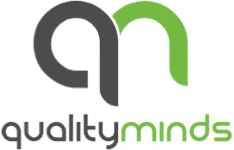As QualityMinds, we love to attend various community events. Whereas in the last years we mainly went to technical conferences and meetups (in the areas of testing, software engineering, artificial intelligence or learning), this year we decided to get to know and understand the technical domains of our customers even better. Thus, we selected several promising congresses from the public, finance, insurance, manufacturing and automotive sectors. The 9th Bavaria Future Congress, which took place on 09.02.2023 in Munich, presented a great opportunity to get deeper insights into the public sector and the challenges that the government agencies and local authorities face. Susanne, Veronika and Michael spent a whole day participating in lectures, workshops and panel discussions, learning about the advancements as well as the challenges in this exciting field.
What did we learn?
Bavaria is working on digitization in the public sector with a whole host of plans, projects and initiatives. The current Bavarian State Minister for Digital Affairs, Judith Gerlach, described it concisely in her keynote speech and presented the vision for the next few years. Particularly the city of Munich and its IT department accomplished a lot recently, for example, they created a multicloud, digitalized the majority of processes in the Department of Public Order, implemented the Online Access Act and several New Work initiatives, to name only a few. These achievements can be attributed to the size of the city and the budgets available, but also to the commitment of the various departments, among them the IT and their employees, who are driving these projects forward. Munich Municipal Services are also a very good example of progressing digitization. The Online Access Act (OZG), should have been fully implemented by the end of 2022. However, several lectures and discussion panels highlighted numerous challenges for the practical implementation. Many obstacles, which slow down or even impede digitalization, were found in regard to budgets, capacity or current legislation. The so-called OZG 2.0 should help alleviate some of the problems and the time constraints. Trends such as OZG, Cloud, New Work, Open Government, Smart Cities, Artificial Intelligence and new (digital) business models are big part of the discussions held between users (authorities and municipalities) and service providers from the IT sector.
Which challenges for the public sector should be expected in the next couple of years?
Many of the currently existing special laws either do not help with the implementation of digital services, massively hinder them or even lead to absurd situations (such as PDF files, which are generated online but must be delivered to the office in printed form). Technological change is shaped by digitization and the expectations of end customers (citizens and companies). The necessity of this change seems to be generally accepted – it’s more a matter of “how” rather than “if”. IT security also plays an overall important role in this context. Demographic change and new ways of work (within the public sector) call for organizational and cultural change and such transformation requires participation, persuasion and, last but not least, time.

We face some of these challenges in our daily work with and for the customers in the public sector. As an IT consulting service, we obviously support technological change. Nevertheless, we share the conviction that more and more importance is laid to the end customers’ needs, E2E processes from a business perspective, change management and learning in the organization, i.e. organizational development. People, not the technology, are coming more in focus. Employees in the public sector bear the main burden in this process and require special support and motivation in order to be able to shoulder this mammoth task.
If you have questions or want to exchange ideas on the exciting topics around the public sector, we cordially invite you to visit https://qualityminds.com/industries/e-government/ and contact us. We are looking forward to talking to you!


0 Comments